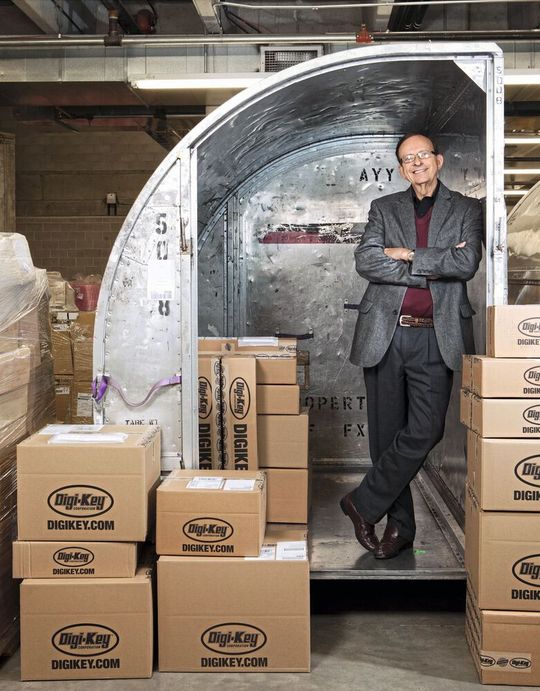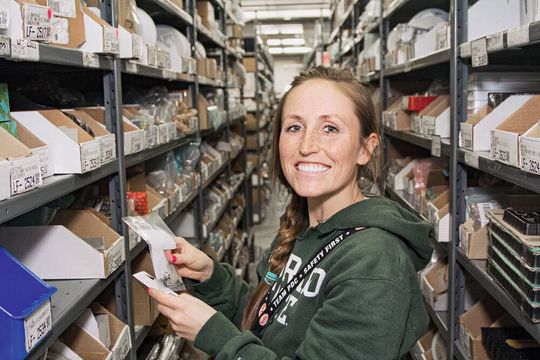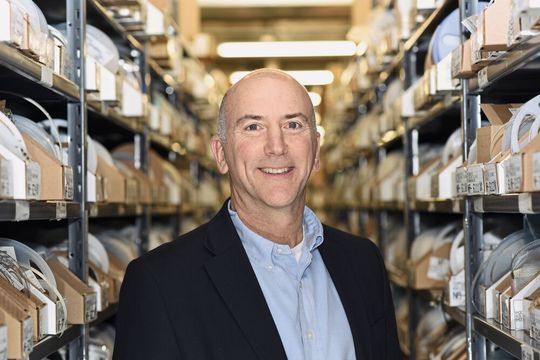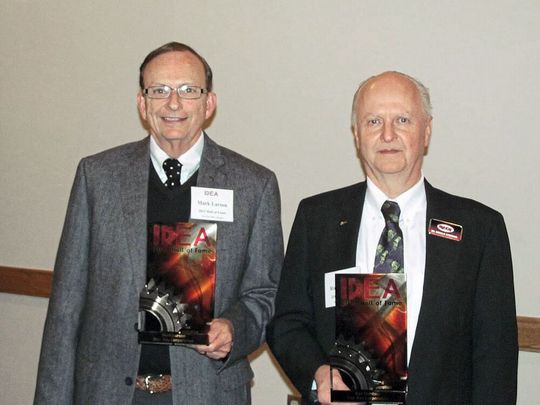Milestones in electronics From Electronic Morse Keyer to Global Company
Anbieter zum Thema
How two classmates from Minnesota started to conquer the world. A story about openness, courage, idealism and trust - and a portion of luck.

Thief River Falls. Heard of it? Probably not. It is a tiny dot on the globe, a town far up in the northwest of the States, in Minnesota. The Canadian border is just 110 km away. Open prairie, rich rural farmland. Thief River is where two rivers meet and two rivers that meet. 8000 inhabitants. A couple of natural waterfalls. In winter there is a lot of snow and temperatures drop to -30 degrees. The coordinates: 48°7′N, 96°11′W.
Find the German version of the article here.
In this tranquil town you can find a distribution centre of 65.000 square metres. Next to it a new building is just being erected - another 204.000 square metres. Completion date mid 2021. Both buildings are testimony to the history of a company that started out in the 1970s and developed into one of the great success stories of the electronic industry. A story of open-mindedness, curiosity, courage, idealism, and the mutual trust of two men from Thief River Falls. We are talking about Digi-Key, one of the largest distributors of electronic components worldwide, and the two classmates Dr. Ron Stordahl and Mark Larson.
"Being in the distribution center, you can feel the pulse of the company. You can sense the productivity. It’s just like a well-oiled machine, that’s serving our customers. And it’s just a strong feeling, that you’re a part of something that’s much bigger than any one person and it’s a very cool feeling." (Mark Larson)
Google, Apple, Microsoft – from garage to international enterprise, this is the frequently invoked narrative about the founding of technical companies. The story of Digi-Key is different. It is not a success story in the classical sense but the story of a journey with different phases and victories as well as a few lucky breaks. The first professional steps of the electrical engineer Ron and the business economist Mark can almost be called haphazard. A start-up-coach would probably throw up their hands in horror. Where is the business plan? Goals, milestones, visions? No such thing. So how did the company, which was founded in 1972, manage to secure its success on the fiercely contested world-market of distributors? How did it assert itself against (then) 400 competitors?
Coming home – with a Digi-Keyer in the luggage
Thief River Falls in 1972: After his doctorate Ron Stordahl returns to the town of his youth. At home, his parents' trucking company is waiting. That's where he was supposed to work. But Ron was an engineer through and through. In his luggage he has Digi Keyer, electronic morse keyer kits. No ground-breaking invention but a business idea from his student days which for a while now has been a ray of hope that he could soon become financially independent.
In order to sell the kit, comprised of about 20 electronic components, as sensibly priced as possible to radio amateurs, Ron had bought each component in huge bulks. Although not unpopular, the sale of the keyer kits has not been as successful as he had hoped, neither during his student days nor in Thief River Falls. A lot is left on the shelf. What should he do? Ron recognizes more innovators need electronic components than need Digi Keyers. He decides to sell the remainder of the electronic components individually. It is typical for Ron – giving up is never an option.

Still: where exactly should he start? How can he reach potential customers without any co-workers or storage facilities? By chance there is a company in Thief River Falls called “Marcraft”, a sole trader business, founded by Mark Larson. It is specialised in the distribution of audio equipment. Mark and Ron know each other from high school. Ron asks for storage. Again, by chance a corner of the warehouse is available which Ron rents, thereby not only finding the space he needs but in the long run also a friend and ally.
Mark, a thinker and strategist, helps Ron in word and deed with the setup of his company. The two men complement each other. Four years later the company's turnover amounts to 800.000 dollars and Digi-Key has 14 staff members. A company is born. Digi-Key. It is the year of 1976. This was the beginning, but it was not yet the Digi-Key we know today. In the end, the company's name will be the only thing left of the Digi keyer.
"A lot of people in business want to make a big splash. They want to do something really big. They see Amazon, they see Apple, and they think we've got to do something big. And oftentimes, rather than work hard on serving customers and do all the daily things that have to be done to make the business work, they lose their focus, and they spend it working on dreams. I think to build a business, and you would find even in the more famous stories of an Amazon or an Apple, these businesses grew incrementally. They might have grown very fast incrementally, but they grew incrementally." (Dave Doherty)
Stick with hobbyists, or serve engineers?

Thief River Falls in 1973. The small town and its inhabitants can literally watch how the young company grows day by day. There is still no business plan; that will be approved only a few years later. The young crew, a steady hand on the tiller, driven by currents and the strong will to stay afloat, is sailing through the troubled waters of the company's formation. Two captains, one ship – most of the time the two young men sing from the same hymn sheet.
However, at this point, the strategic orientation of the company comes into the focus of consideration. Should they continue to target customers in the hobby sector or focus more on engineers and professional product developers instead? The young company takes the risk and makes the decision to also target engineers and a broader consumer audience. Mark and Ron place the first ads in electronics trade magazines - and reaches a new clientele. Larger volumes, a wider range of products, higher growth potential – without having planned it, Digi-Key becomes a pioneer in the direct mail catalogue business.
After the strategic alignment, the next problem is just around the corner. Mark is frantically searching for manufacturers who would sign on Digi-Key as distributors. Until his retirement in 2015 CEO Mark Larson will spend half his time seeking manufacturers and negotiating deals. Today more than 1500 manufacturers supply the distributor with their products. However, who would have wanted to work with the newcomers? Too small, too unknown, too inexperienced. Many did not trust them. Others like the big distribution companies were not willing to split the market even more and tried to keep Digi-Key out.
Into the Future with Panasonic
Again, this is where coincidence comes in. This time in the person of a customer who is initially interested in Mark's products. Mark still also runs his own company Marcraft. He accompanies the man to the area of the warehouse where Ron rents the space for his components. Ten employees are just finishing off orders. The man sees this and suggests that he could bring them into contact with Panasonic if Ron agrees. A lucky break. On the very same evening Ron orders electrolytic capacitors. The deal between Panasonic and Digi-Key gets sealed. It will be a win-win-situation for both sides. At that time Panasonic has hardly any customers in the US. With Digi-Key this will change. And Digi-Key will become the largest distributor for Panasonic's electronic components worldwide. Now the strategic direction is clear and there is no doubt anymore about Digi-Key as a potent distributor.
Airplanes over the roofs of Thief River Falls
Thief River Falls in the 1990s: The small town not far from the Canadian border is developing into the international hub of a prosperous company. Its expansion has brought the whole world to the gates of the town. First Digi-Key supplies Canada. Next come Japan, at the beginning of the new millennium the UK and then Europe as well as Asia. Long delivery channels, deliveries within a few hours, faster than their competitors: that was one of the great challenges which Ron and Mark already had to overcome in their early years. As far back as the 1980s the distributor collaborated with the giants of delivery logistics who have had the same agenda – to be fast and reliable. At the time most distributors ship their orders worldwide. Digi-Key, however, breaks new ground.
Thief River Falls already has an airport. Digi-Key is using the airport as a key hub for UPS, DHL, and FedEx package delivery. Huge transport planes take off and land with roaring engines every day in Thief River Falls, a town of 8,000 souls! With the airport Digi-Key stays ahead of the pack.
From Analogue to Digital – the Pathway to Success
Over the years, Ron and Mark demonstrated a keen sense for change at an early stage, reacted at the right time and thus managed the radical change from analogue to digital. In the past the company sent catalogues with up to 3000 pages in which they presented more than 30.000 products. What used to be mail and landline, are nowadays e-mail and the internet. Currently more than 3.7 million online orders reach Digi-Key every year. The company had its first website as early as 1996. Today it has 44 national websites which are translated into 16 languages and accept 26 different currencies. Yet the first computer found its way shortly after the company's foundation onto one of its desks. More or less accidentally. However, that is another story …
"Over the years, as the company has grown from a very small to a nice sized company today, change sometimes came very fast, very dramatic. But this is a company culture, that has embraced change." (Mark Larson)
The mission: Enabling the World’s Ideas
Looking back on the beginning of the story – 150 different components lay the foundation for a world success. Today Digi-Key presents around 2.6 million electronic components from more than 1500 suppliers which find their way within a few hours to the front door of their customers. While their competitors often work with decentralised distribution strategies, Digi-Key have always banked on centralised warehousing for a particularly broad-ranging portfolio.

The people of Digi-Key have had their finger on the pulse of the industry, reacted to changing needs and have offered a vast spectrum of electronic components. These days Digi-Key provides three times more products than average distributors. Their customers' needs, projects and innovations have always occupied centre stage for the company. Digi-Key wants to help the world to realise its ideas which is also reflected in the size options of their orders. If someone needs just one single component, the company is always willing to send that one piece. Enabling the world's ideas.
"If you can't find a particular component at Digi-Key then the part doesn't exist, or it's not worth designing in." (Dave Doherty)
A big family – with more than 4000 employees

Thief River Falls is Digi-Key. Digi-Key is Thief River Falls. Today a majority of the inhabitants work for Digi-Key. Over the years a strong bond and identification have developed which is very rare for a business that size. The town witnessed the foundation of the company and its rise, step by step: The first Digi-Keyer kit. The back of a garage. A mail-order catalogue. The digital age brought about by the internet. The transition in leadership to Dave Doherty in 2015.
The one constant throughout has been the people and the unique culture based in Thief River Falls, Minnesota. Notions like honesty, fairness, friendship, and responsibility outline the company culture. They are nowhere written down, seen on no walls or nowhere near the entrance. Yet these values and the appreciation of each other have always been there – just there. Thief River Falls continues to be a small town, family-oriented, close. When the company's doors open today you can literally feel this spirit. Every toddler in Thief River Falls knows the logo of Digi-Key.
"At Digi-Key, people truly are a differentiator. Every day, we show up for one another, for our customers and in our community. There is a real compassion for others and a shared commitment to enabling others to succeed." (Dave Doherty)

Ron and Mark have always had faith in the town and its people and believed in their own sure feeling for the needs of their customers. This has paid off – for them and the firm. More than 4000 employees and an annual turnover expected to reach 3.4 billion dollars in 2021 (a doubling since 2015) leave no doubt.
When Mark thinks back on the years of the company's foundation and its rise, he talks about the step by step development of Digi-Key. The two men were like young explorers on the long journey to success where they stayed open to all possibilities. Digi-Key has always remained loyal to the small town near the Canadian border which is outstanding for such a large enterprise. These days Dave Doherty, CEO since 2015, controls the fate of the global corporation with its panoramic view of prairie and rural farmland, where two rivers meet. Digi-Key has taken off, yet never lost its grounding. In 2022 Digi-Key will be 50 years old. Thief River Falls and the world will celebrate.
* Anja Gild is an expert in storytelling and trains corporate communicators and journalists in storytelling for online, social media and print as well as in texts for the internet, intranet and social media. The freelance journalist and trainer also offers individual training in the areas of storytelling, writing and creative writing.
Artikelfiles und Artikellinks
Link: More about Digi-Key
(ID:47284880)



:quality(80)/p7i.vogel.de/wcms/ed/b3/edb3872e6b2694039a712ba762bf5ea3/0118168079.jpeg)
:quality(80)/p7i.vogel.de/wcms/08/cb/08cb1b39d0e5c58591bc70e8b63a0220/0118078425.jpeg)
:quality(80)/p7i.vogel.de/wcms/8f/e8/8fe846e9bc5577c77430aee8a0a68599/0118091177.jpeg)
:quality(80)/p7i.vogel.de/wcms/d6/10/d6101a2aac8c7d2cab2ff31546979254/0118103063.jpeg)
:quality(80)/p7i.vogel.de/wcms/29/c2/29c2b968dc07be08e6062d8e6d8c387b/0118061450.jpeg)
:quality(80)/p7i.vogel.de/wcms/0d/0f/0d0f07610ae64127bd49e5512e847f00/0118071390.jpeg)
:quality(80)/p7i.vogel.de/wcms/90/27/9027f3a201ad0e0eeeecc53846e2a990/0118165202.jpeg)
:quality(80)/p7i.vogel.de/wcms/fe/b1/feb1ceb3750245197d7851df67e05479/0118163169.jpeg)
:quality(80)/p7i.vogel.de/wcms/d0/15/d01573f5c7986989d4fa27fecdb17c32/0118126305.jpeg)
:quality(80)/p7i.vogel.de/wcms/5f/c6/5fc62a91bffb6c673c36722011f8205c/0118076327.jpeg)
:quality(80)/p7i.vogel.de/wcms/1e/51/1e513481ef401300756c3bb189188c01/0117631502.jpeg)
:quality(80)/p7i.vogel.de/wcms/f3/24/f3245522a3428e1787cd2418d901c62c/0118152080.jpeg)
:quality(80)/p7i.vogel.de/wcms/76/61/7661ad444bc8046dc32738fdf312fa39/0118122462.jpeg)
:quality(80)/p7i.vogel.de/wcms/d4/4e/d44e7b47836ec8a9f792b7bcbc0247be/0118105188.jpeg)
:quality(80)/p7i.vogel.de/wcms/c9/22/c9228b8ec955c03dc075e8875f4cabf8/0117754897.jpeg)
:quality(80)/p7i.vogel.de/wcms/07/6f/076f09c7a697f193091a6e6be846aef1/0117862638.jpeg)
:quality(80)/p7i.vogel.de/wcms/30/51/305138abdaeda721646661bf6ac4fdbd/0117756540.jpeg)
:quality(80)/p7i.vogel.de/wcms/3c/b9/3cb980e98baaaadddf69a5dad4ad20a0/0117334644.jpeg)
:quality(80)/p7i.vogel.de/wcms/79/4b/794b7d23361d39306753a0abab662274/0117836261.jpeg)
:quality(80)/p7i.vogel.de/wcms/f3/88/f388bad02124a8ac7fc5663627838b69/0117819459.jpeg)
:quality(80)/p7i.vogel.de/wcms/2b/cc/2bccc41bb07c895dda4839b927d8c265/0116514416.jpeg)
:quality(80)/p7i.vogel.de/wcms/1e/5a/1e5a931b4b81371d6761358130476db5/0117914243.jpeg)
:quality(80)/p7i.vogel.de/wcms/f7/a8/f7a8de2339926d03f6309495bb3e3cdf/0117808261.jpeg)
:quality(80)/p7i.vogel.de/wcms/18/32/1832350986a019c0f74079c2fd03fa28/0117909885.jpeg)
:quality(80)/p7i.vogel.de/wcms/ce/39/ce39b8746f3a7c4fe740dd2ab7ae398e/0117870832.jpeg)
:quality(80)/p7i.vogel.de/wcms/77/25/7725cc7179a8901c88f54d63f786f503/0118089114.jpeg)
:quality(80)/p7i.vogel.de/wcms/08/de/08de3cefb97266232f475bb011d9b0c6/0118162151.jpeg)
:quality(80)/p7i.vogel.de/wcms/a2/24/a2249bc111c69b9af5404fc356834e9b/0118129754.jpeg)
:quality(80)/p7i.vogel.de/wcms/16/cc/16cc54cea371a36ebef7a53b952f8516/0118069700.jpeg)
:quality(80)/p7i.vogel.de/wcms/15/74/15744e690ff03eef2b863223b28604fd/0118160633.jpeg)
:quality(80)/p7i.vogel.de/wcms/0f/63/0f6307f7514bc193712954c50b80f0f7/0118163432.jpeg)
:quality(80)/p7i.vogel.de/wcms/7d/41/7d4118afaafc06500e8f54ebf6079493/0118116849.jpeg)
:quality(80)/p7i.vogel.de/wcms/c2/66/c266c5cfbc51fb7d06557ee079d406bf/0116839110.jpeg)
:quality(80)/p7i.vogel.de/wcms/3a/1a/3a1a267224e51b795ccc6b8df959f18e/0115998041.jpeg)
:quality(80)/p7i.vogel.de/wcms/3d/14/3d1447535880e284712d1daba8d7d466/0115848899.jpeg)
:fill(fff,0)/images.vogel.de/vogelonline/companyimg/9600/9682/65.jpg)
:fill(fff,0)/images.vogel.de/vogelonline/companyimg/130400/130457/65.jpg)
:quality(80)/p7i.vogel.de/wcms/47/3e/473ee365021b176dbb3d29b73b7c2bb5/96883913.jpeg)
:quality(80)/p7i.vogel.de/wcms/a4/d4/a4d4cd01dc337366b4a6d5d8dad8cfaa/96883876.jpeg)
:quality(80)/p7i.vogel.de/wcms/1b/82/1b82a84df5d2b7d98d7bbcd0f4e98bdf/0101695363.jpeg)
:quality(80)/p7i.vogel.de/wcms/b1/e1/b1e154446080a5c5438fc7a8cfb3cff5/96883882.jpeg)
:quality(80)/p7i.vogel.de/wcms/bc/09/bc094ee0f66acecbf301cc9772a855f2/0111631608.jpeg)
:quality(80)/p7i.vogel.de/wcms/be/8a/be8ad85aeaad9048489315c8c07e936a/0112163251.jpeg)